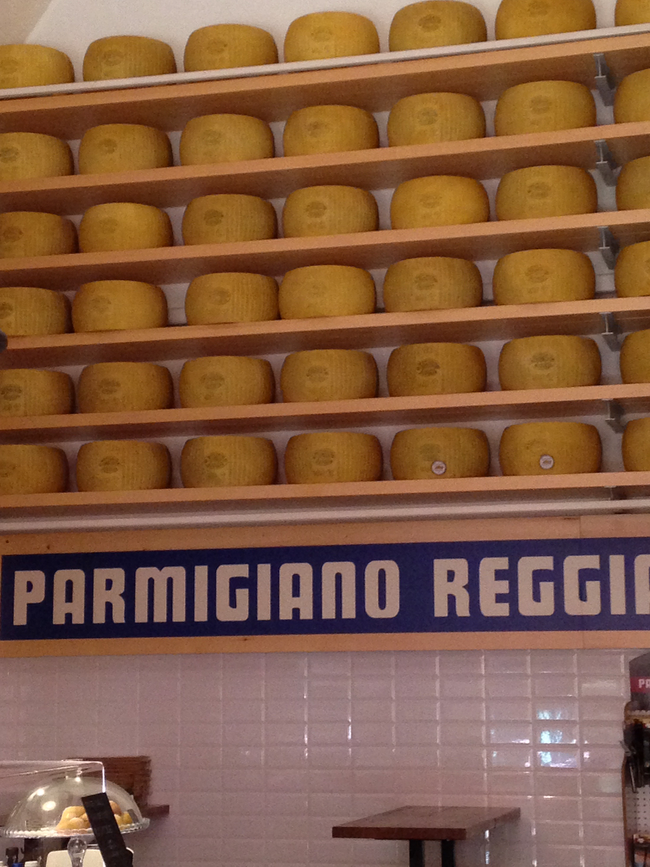Rob and I this summer spent 10 days in Italy. Ten glorious days. We started in Lucca, a charming town in Tuscany, then spent a full week in Bologna, the spiritual center of Italian food and the capital of its breadbasket, Emilia-Romagna. I simply can’t rave enough about Bologna, with its lovely architecture, its narrow cobbled streets and its food shops.
Oh, its food shops! The Quadrilatero, a maze of tiny streets lined with produce vendors, butchers and salumerias, fresh pasta shops, cheese emporia … you can’t even imagine. It was bliss. Even the neighborhood just outside the Centro Storico (the city center), where we stayed for the week, had lovely food shops that met our every daily need: the latteria with its dairy goods and other essentials, the pasticceria with homemade breads and pastries, the salumeria with meats and charcuterie, the produce stall with lots of fresh fruits and vegetables. All right around the corner from our apartment.
We rented an apartment specifically so we could cook. Going into all those lovely shops and not purchasing yummy things to make would have broken my heart. I would say that we cooked a ton while we were in Bologna (we ate dinner at “home” every night), but we didn’t do more than boil water for pasta and slice tomatoes and mozzarella for caprese salads. We cooked—and ate—simply and well.

Weeks after we returned, Italy is still in my heart. I have no claim to it, but I miss it dearly. While they are fresh, I wanted to journal a few impressions of Italian food and culture, impressions that I intend to incorporate into my daily life here in the U.S.
Traveling outside the States is so richly informative, because it opens your eyes to how other people and cultures exist in the world. No country is perfect, certainly not ours. I observed so many practices and norms and ways of doing things in Italy that inspired me to live differently here.
Take food. Food in Italy is ridiculously inexpensive. Like half of what it costs here. A great bottle of wine was 10 euros. A 2-pack of yogurt was 1 euro. A liter of water was about 19 cents. I don’t know why that is. But it was noteworthy.
At the same time, food is very high quality. Fresh. Local. Yes, we were living for the week in Italy’s breadbasket; the peaches and apricots the apartment owner left for us on the kitchen table were from their own fruit farm outside the city. While we didn’t venture into a large grocery, everything we saw, even in the tiniest shops, was of the highest quality.

Perhaps because food is so high quality, Italians don’t overconsume it. There’s a respect for food—and the people who grow, prepare and sell it. Portion and package sizes are sensible; waste is minimal. For Italians, the hunger and deprivation of war are not-too-distant memories. Food is valued. Maribel, who taught the cooking class I loved in Bologna, spoke with great seriousness about not wasting the scraps of our homemade pasta, because the previous generation knew what starvation felt like. We owed it to them to not waste food.
Home life is designed for a small footprint. Refrigerators are half the size of what they are here. You shop for just a few days at a time. (Which isn’t at all an inconvenience, because the shops are literally down the block.) There’s practically no mass-produced, prepared, boxed-and-frozen food. Because ingredients are so fresh and dishes are so simple, it’s not a hassle to cook every day. And if you’re exhausted and can’t turn on the stove, there are fresh house-made salads, meats and cheeses in the market right beyond your doorstep. Or the neighborhood trattoria.
Everything gets recycled. In our apartment’s kitchen, there were separate, sturdy totes for paper, glass/metal and plastic. And a bin by the sink for food scraps. Each household is responsible for sorting and managing their trash and carrying it out to big bins on the street. With homes, streets and cars packed in so tightly, there’s no room for every home to leave a bulky trashcan on the sidewalk, and no room for trash trucks to trundle along once a week picking up bins one by one. Trash, like so much of life in Italy, is a communal effort, and it fosters a small footprint.
It was all so different … so small, so self-contained, so minimal … compared to life in the States. Americans think it’s our birthright to have endless choices in the grocery, to expect huge portion sizes when we dine out, to drive a XXXXL-sized vehicle, to live in a house that’s twice what we need, to buy as much cheaply made clothing as we want. And where does all this multiplicity of choice leave us? With food-induced health and environmental crises, sprawl, long commutes, disconnect from community, and a closet full of regrettable purchases. Heck, you can pay money to hire a company to haul away all that stuff you bought that you never needed (or wanted) in the first place. Bigger, bigger, bigger, more, more.
Immersing myself in Italian life, for just a brief week, made me feel sad about many aspects of American life. I’m not sure there’s a solution … or that most folks even see this as a problem. As for me, I’ll keep working toward the motto that Rob and I have set for ourselves:
Live analog. Live slow. Live small. Live local.
